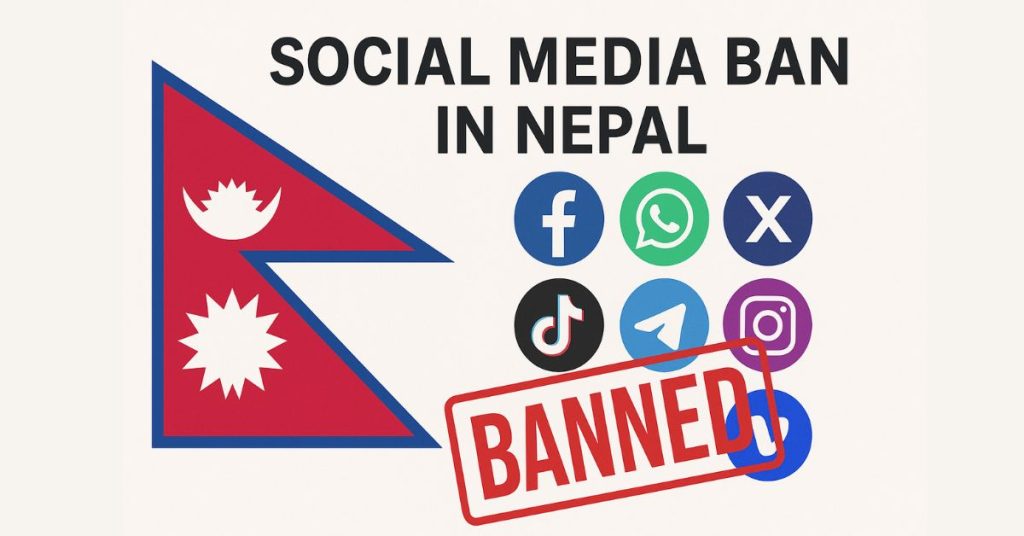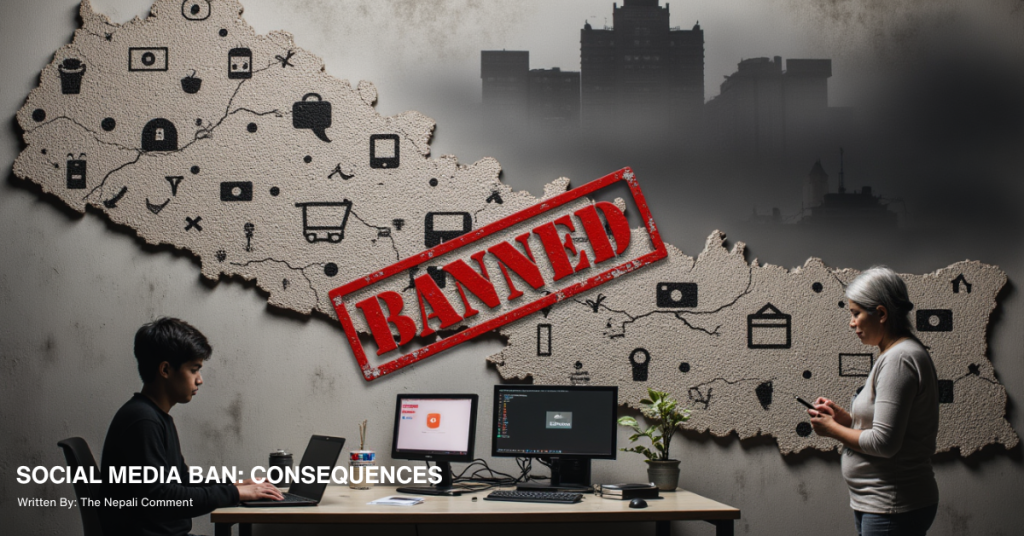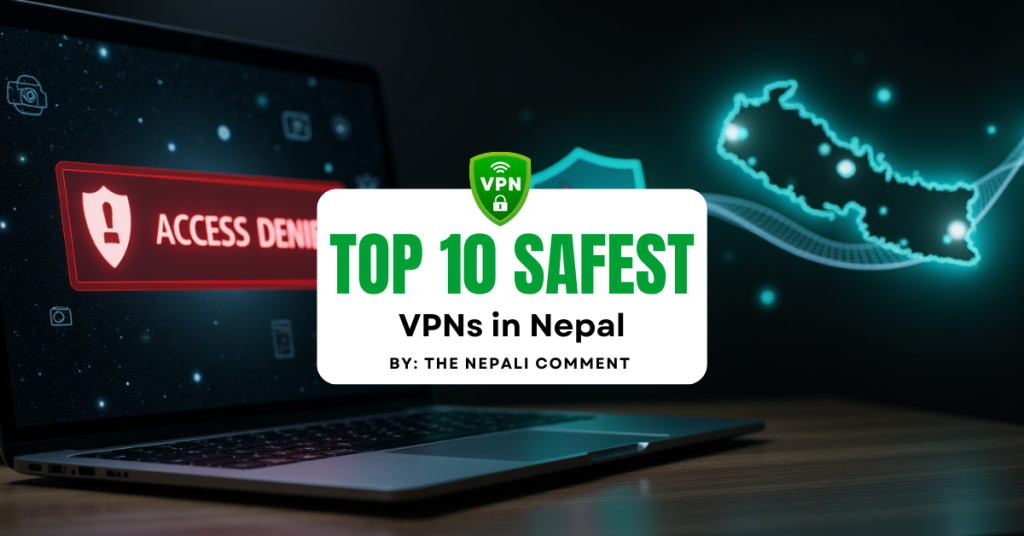The decision to restrict social media platforms in Nepal stems from a directive of the Supreme Court of Nepal, which ruled that all online and social media services operating in the country must register with the government. Following this order, the Ministry of Communication and Information Technology issued a public notice requiring both domestic and foreign platforms to comply within seven days.
The notice makes it clear: platforms that do not register by the deadline will face gradual blocking by the Nepal Telecommunications Authority (NTA). The government argues that mandatory registration is essential for accountability, tackling online fraud, and ensuring that users have a formal channel to address grievances.
Why the Government Is Enforcing Registration
The government’s move is backed by clear legal foundations. The Social Media Management Directive 2080 (2023 A.D.), introduced under the Electronic Transaction Act 2063, sets out mandatory rules for all social media platforms operating in Nepal. This framework gives the Ministry of Communication and Information Technology the authority to demand registration from both domestic and international companies before they provide services in the country.
The purpose of the directive is straightforward: to ensure accountability, curb the rising cases of cybercrime and online fraud, safeguard user safety, and strengthen content moderation on platforms that influence millions of Nepali users. By having a local presence and designated officers for compliance, grievance handling, and monitoring, the government aims to make these platforms legally and socially responsible.
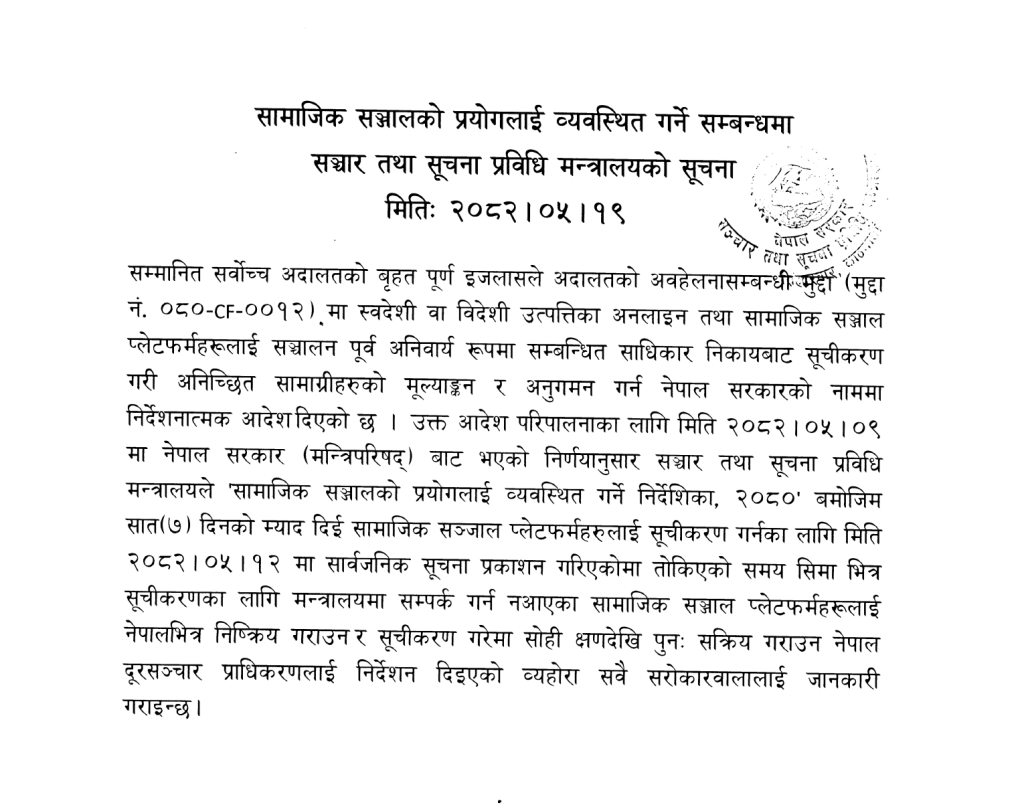
The push gained momentum after a ruling by the Supreme Court of Nepal, which instructed the government to regulate online platforms more strictly. Acting on this, the Council of Ministers (Cabinet) decided in late August 2025 to enforce the registration requirement, giving platforms a short deadline to comply. Those that failed to meet the deadline are now being gradually blocked by the Nepal Telecommunications Authority (NTA).
Which Apps Are Facing a Ban?
The government has clearly separated platforms into two groups: those that completed registration and remain accessible, and those that failed to register and are now being blocked.
Registered Platforms (Allowed to Operate)
The following services have completed the mandatory registration process and continue to be accessible in Nepal:
- Viber Media
- TikTok
- Saransh Media Lab
- Wetalk
Unregistered Platforms (Blocked or Being Blocked)
Popular global platforms that did not meet the registration deadline are now facing restrictions. This includes many apps that Nepalis rely on daily for communication, entertainment, and professional networking:
- Snapchat
- Telegram
- YouTube
- X (Twitter)
- Netflix
- Threads
- Discord
- Reddit & so on.
Status Table: List of Apps Facing a Ban in Nepal
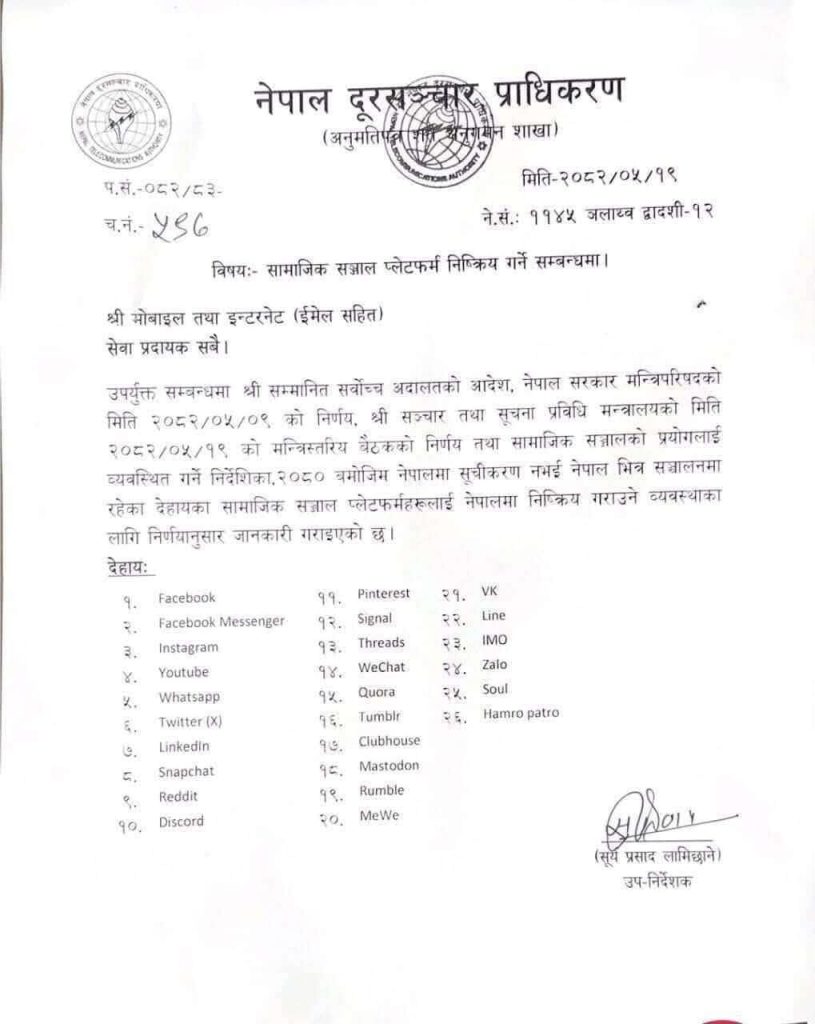
| App / Platform | Registration Status | Action in Nepal |
|---|---|---|
| Viber Media | Registered | Allowed |
| TikTok | Registered | Allowed |
| Saransh Media Lab | Registered | Allowed |
| Wetalk | Registered | Allowed |
| Unregistered | Blocked / Restriction | |
| Messenger | Unregistered | Blocked / Restriction |
| Unregistered | Blocked / Restriction | |
| YouTube | Unregistered | Blocked / Restriction |
| Unregistered | Blocked / Restriction | |
| X (Twitter) | Unregistered | Blocked / Restriction |
| Unregistered | Blocked / Restriction | |
| Snapchat | Unregistered | Blocked / Restriction |
| Unregistered | Blocked / Restriction | |
| Discord | Unregistered | Blocked / Restriction |
| Unregistered | Blocked / Restriction | |
| Signal | Unregistered | Blocked / Restriction |
| Threads | Unregistered | Blocked / Restriction |
| Unregistered | Blocked / Restriction | |
| Quora | Unregistered | Blocked / Restriction |
| Tumblr | Unregistered | Blocked / Restriction |
| Clubhouse | Unregistered | Blocked / Restriction |
| Mastodon | Unregistered | Blocked / Restriction |
| Rumble | Unregistered | Blocked / Restriction |
| MeWe | Unregistered | Blocked / Restriction |
| VK | Unregistered | Blocked / Restriction |
| LINE | Unregistered | Blocked / Restriction |
| IMO | Unregistered | Blocked / Restriction |
| Zalo | Unregistered | Blocked / Restriction |
| Soul | Unregistered | Blocked / Restriction |
| Hamro Patro | Unregistered | Blocked / Restriction |
Impact on Users in Nepal
The sudden enforcement of registration rules has a wide impact on everyday life in Nepal.
Daily Communication Disruption
Apps like WhatsApp, Messenger, and Facebook are primary communication tools for millions of Nepalis. With these platforms facing restrictions, users may struggle to stay connected with family, friends, and colleagues, especially those living abroad.
Effect on Businesses and Marketing
Small businesses, online shops, and service providers heavily rely on Facebook and Instagram for advertising and customer engagement. Blocking these platforms reduces visibility, disrupts digital marketing campaigns, and forces companies to look for alternative channels.
Education and Professional Networking
YouTube is a major source of free education, tutorials, and training content. LinkedIn is equally important for job seekers and professionals. Restrictions on these platforms could slow down access to knowledge and networking opportunities.
Rise of VPN Usage
Many users are expected to switch to VPN services to bypass restrictions. However, authorities have already cautioned that indiscriminate VPN use could invite legal consequences. This raises new concerns around privacy, security, and compliance.
What Social Media Companies Must Do
To continue operating in Nepal, social media platforms must comply with the government’s new rules. The requirements are outlined in the Social Media Management Directive 2080 (2023 A.D.) and reinforced by the recent Cabinet decision.
Mandatory Registration
Every domestic and international platform must register with the Ministry of Communication and Information Technology (MoCIT). Without registration, services are considered illegal and subject to blocking by the Nepal Telecommunications Authority (NTA).
Local Representation
Registered platforms are required to appoint three representatives in Nepal:
- Contact Person – to coordinate with government agencies.
- Grievance-Handling Officer – to respond to user complaints and resolve issues locally.
- Compliance/Self-Regulation Officer – to monitor platform activity and ensure that published content follows Nepal’s laws and regulations.
Ongoing Monitoring
Beyond registration, companies must actively cooperate with law enforcement, address harmful or fraudulent content, and provide accountability for how user data and interactions are managed.
This framework signals that Nepal wants not only visibility into global platforms but also local accountability to protect users and maintain social order.
Public and Expert Reactions
The government’s decision to block unregistered social media platforms has drawn mixed responses from different groups in Nepal.
Support for the Move
Some experts and policymakers argue that the decision is necessary to control cybercrime, online fraud, and misuse of digital platforms. With mandatory registration, authorities believe they can hold global companies accountable, protect citizens from scams, and create a safer online environment. Supporters also point out that a local grievance-handling system will make it easier for users to report abuse or illegal activities.
Concerns and Criticism
On the other hand, civil society groups, digital rights activists, and many everyday users have raised concerns. They argue that the ban restricts freedom of expression, disrupts connectivity, and places Nepal at risk of digital isolation. Businesses that depend on Facebook and Instagram for sales and marketing fear significant losses. Students and professionals relying on platforms like YouTube and LinkedIn worry about losing access to learning resources and global opportunities.
Growing Uncertainty
The situation has created widespread uncertainty. Many users have already turned to VPNs to bypass restrictions, but the Nepal Police has warned that indiscriminate VPN use could attract legal scrutiny. This leaves individuals and businesses unsure of how long the restrictions will last and what the long-term digital landscape will look like.
What’s Next for Social Media in Nepal?
The future of social media access in Nepal now depends on how quickly global platforms respond to the government’s demands.
Will Major Companies Register?
The biggest question is whether companies like Meta (Facebook, Instagram, WhatsApp), Google (YouTube), and X (Twitter) will formally register in Nepal. If they comply, these platforms could be restored without long-term disruption. If they continue to resist, restrictions are likely to remain in place, creating lasting gaps in communication and business tools for Nepali users.
Possible Policy Adjustments
The government has signalled that it is open to reactivating services once registration is complete. This suggests that the ban is not necessarily permanent but rather a pressure tactic to enforce compliance. However, without cooperation from the tech giants, users may have to depend on registered alternatives or VPNs.
Long-Term Digital Landscape
The outcome of this enforcement could set a precedent for digital regulation in Nepal. If companies comply, Nepal will gain more oversight and local accountability over global platforms. If not, users may face a fragmented online environment, relying on fewer registered apps like TikTok and Viber, while losing access to widely used global services.

